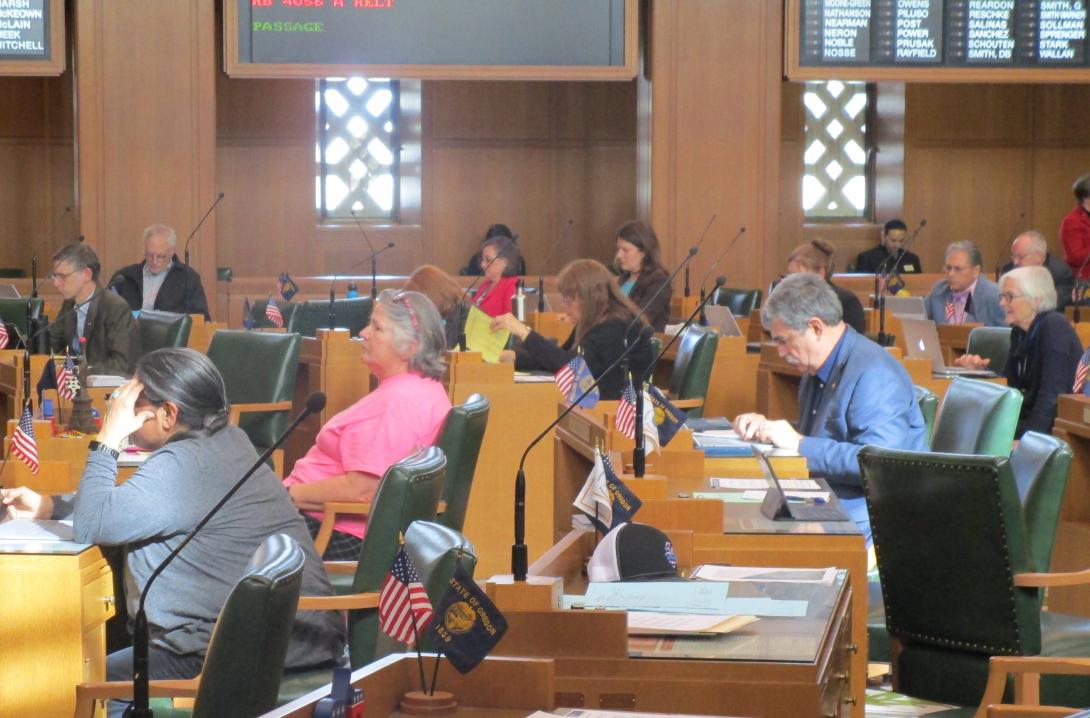
In a year in which universal health care is front and center on the political stage, Oregonians may get to cast a vote on the issue in November.
The House on Monday passed a proposed amendment that asks voters if the right to affordable health care deserves a place in the state constitution. The proposal’s passage would likely affect state officials and lawmakers, forcing them to craft policies that would ensure some sort of universal coverage. But opponents in the House warned that it could backfire with by pumping up health care costs, spur litigation and discourage medical providers from entering Oregon.
House Joint Resolution 202 is the fourth attempt by Rep. Mitch Greenlick, D-Portland, to make health care a constitutional right for all Oregonians. The House passed the resolution with a 36-21 vote, mostly along party lines. The measure now goes to the Senate.
For Greenlick, also former chair of the House Committee on Health Care, getting a constitutional amendment would be a legacy-setting achievement in his last session before retiring. The goal has eluded him in the past. Greenlick has made three other failed attempts, most recently in 2018, when the House passed the measure but it died in the Senate.
“This referral is about affirming, once and for all, our commitment to ensuring health care is a fundamental right for all,” Greenlick said in a statement after the vote. “Oregon has made significant progress in the last couple of decades to decrease the number of people who are uninsured. We have to do more though to make sure we are removing barriers to access so that every person in our state is able to get the care they are entitled to.”
The amendment’s language says it’s the obligation of the state to ensure that every resident has access to “cost-effective, clinically appropriate and affordable health care as a fundamental right.” The proposal calls for balancing that obligation against other state needs, including
education and other public services.
“We are all at our best when Oregon is at its best, and without a healthy population, our state will never achieve its full potential,” said Rep. Rob Nosse, D-Portland and vice-chair of the House Committee on Health Care.
The proposal drew support from Rep. Andrea Salinas, D-Lake Oswego and chair of the House Committee on Health Care. She said the proposal’s language balancing health care with other public interests shows Greenlick has listened to concerns voiced in 2018.
“Nothing in this resolution picks winners and losers,” Salinas said, adding that it doesn’t advocate for a single-payer system or “socialist health care system.”
Lawmakers who opposed the proposal said it was too vague and likely to end up in the court system.
Rep. Cedric Hayden, R-Roseburg and vice-chair of the House Committee on Health Care, opposed the measure. He said it would open up the state to uncertainties and make it easier for residents to sue the state. The threat of legal action also would hamper the state’s ability to recruit health care providers to Oregon, said Hayden, adding that rural areas are struggling to attract providers.
You can reach Ben Botkin at [email protected] or via Twitter @BenBotkin1.
Comments
HJR 202
I fail to understand Rep. Hayden's assertion that passage of this measure would hamper recruitment of health care providers to Oregon.
Let the voters of Oregon decide on this value-based ammendment to the state constitution, as a guide to future lawmakers!


Rep. Hayden raises flags that have already been unfurled. The state does little about controling the rising cost of health care and pharmacueticals. As far as law suits, that dog won't hunt, because litigation is already available to anybody for any reason already. Let the people vote. Let the people establish the importance of health care for them and their families.